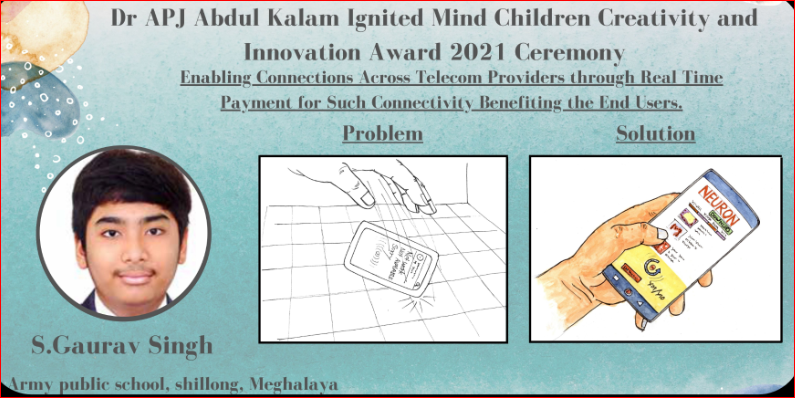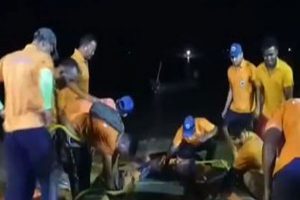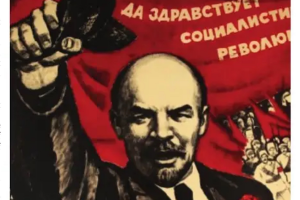Dr. APJ Abdul Kalam award 2021: Providing internet access to people with disabilities, easy passage of garbage collection vehicles along the conveyor belt, converting kitchen waste into manure, developing writing instruments for the blind, and NEURON (Networking for End Users as Reachable Organisaed Nexus) etc, among other creative suggestions that won the Dr. APJ Abdul Kalam Ignited Mind Children Creativity and Innovation Awards, 2021.
The awards were conferred on June 23, 2022, at a virtual ceremony. Every year, these award are given in honour of former president Dr. A.P.J. Abdul Kalam jointly by the Honey Bee Network, Society for Research and Initiatives for Sustainable Technologies and Institutions (SRISTI), and Gujarat-Grassroots Innovation Augmentation Network (GIAN).
Both Prof Anil Gupta, the founder and convener of SRISTI, and Dr. R. A. Mashelkar, chairman of the SRISTI Board and chief guest of the event, attended the ceremony to show their support for the young awardees. Eight students were chosen for the prizes while twelve students were given appreciation certificates.
Advertisement
The ‘APJ Abdul Kalam Ignited Mind Children Creativity and Innovation Awards’ 2021 received around 4200 innovative ideas from children in 24 states through online and offline submissions. A jury comprising distinguished experts evaluated the shortlisted ideas and selected 20 innovative ideas for awards and appreciation, a statement said.
Prof. Anil Gupta recalled how he received all the support and direction for recognising the initiatives of children from late Dr. APJ Abdul Kalam, the former president. President Kalam believed that young imaginative mind new perspectives contribute to India’s development.
Some young and Ignited awardees
Avni class 9 from Amity International School in Uttar Pradesh received this award for Accessibility of the internet for the visually challenged and disabled. Explaining her concept with The Statesman she said, “I and my friend Adity Manuja developed this project as part of a class assignment.” Her innovation is a piece of artificial intelligence-enhanced computer software that enables users to pose queries to the speaker, who then converts the request into text. Since the application is still in the prototype stage, anybody can utilize the internet to download and use it. “My parents work in the IT industry, so they can teach me about coding and the books that are out there”, said Avni.
Hrishikesh Prashant Kakde,a student of Vivekananda Vidhyalaya Yavatmal, Maharashtra, was recognized for his innovative proposal of a garbage collecting van through a conveyor belt. “I got the idea of this conveyor belt from my own experience. I drop my garbage bag in the trash vehicle every day. This is an open source of diseases. If a conveyor belt is connected to the garbage van, a trash bag can be put on it and the same may be transported inside a vehicle directly, he explained during the conversation with The Statesman.
Anushka Gupta class 12 student of Jay Hind Vidya Mandir Inter College in Aharaura of Satyanganj in Uttar Pradesh who got an appreciation Certificate said that she left the village because she was disgusted by the trash that was being dumped from homes and cities.
She turned the lack of facilities to convert kitchen waste into manure in a hobby. “A lot of kitchen waste ends up in drains, a device was created that could produces a compound of food waste and water that is then transferred to a small irrigation field. This device separates plastic from food waste and water, fills the tank to a certain level, connects the motor to the tank, and produces the compound” Anushka explained to The Statesman.
A class 7 student Abhijeet Kumar Jha from New Era Senior Secondary School from Vadodara conceived the idea of ‘Writing pen for the blind’, while he was in sixth grade.
He wishes to become a good human being with a keen interest in social issues and sciences was given an assignment at school to conceive an idea on resolving any social challenge along with steps/ devices required to do that. He thought of making a pen that can help blind people to write by mechanism having text-to-speech and speech-to-text (dual feedback). He made drawings and described steps and planned to develop a handy prototype in a nearby electronic laboratory.
While explaining his innovation he said, “ It is possible make such a pen with the help of two cameras, a proximity sensor, a motion sensor, and software programming. Cost-effectiveness will depend on replacing costly sensors with the help of a circuit and infrared device.”
“If a compact pen is developed, any blind person can use it to write and spell-check any immediately written word by him/her” he added
In today’s modern India, where the internet is not a luxury but a necessity, many cities in India are experiencing network problems. Gaurav Singh, a class 9 student at Army Public School in Shillong, Meghalaya came up with the idea of NEURON (Networking for End Users as Reachable Organisaed Nexus), where one can use the service of the other network by paying a small amount decided by the networking companies.
There are several telecom services available in India. However, some isolated locations might not have all networks available. A straightforward application that verifies the availability of network and internet connections in remote regions is developed as a solution to this problem. When the alternative network is accessible, the program just changes to another connection.
Speaking to The Statesman Gaurav Singh said , while visiting my family at a hill station, I realised there were many network problems in our area, so I thought why not create an app where all the networks are accessible at once, allowing users like us to choose the provider, pay the costs, and enjoy the services. I created my project during the COVID-19 era:. Gaurav credits his family and teachers as his motivation. With the help of government funding, a proof-of-concept application could be made possible.
The winning entry also included Harsh Kumar, a student from Bilaspur who is in the 12th grade. He was there are no homeless shelters on the streets in his hometown. He used this to the exclusionary features of online learning for kids with special needs.
Class 9 Innovator Arka Ash from West Bengal’s Durgapur Paschim Bardhman creates a broom which can clean the difficult areas under the intricate designs of furniture.
Himanshu Sharma, an 11th grader in New Delhi, raises the issue of the crop fields. He realised that there is no device which can identify and tweak away undesirable plants (weeds) for the crops. He came out with an innovative idea for this.
Ruby Gupta, a 10th-grade student in Sipat, Chhattisgarh, discovered the problem was caused by a lack of technology that tracks human body dehydration and found the solution.
For the competition, entries are accepted from students up to class 12 or youngsters up to the age of 18. This prize seeks to foster a samvedana (sensitivity) culture among the youngsters in order to meet societal challenges. The goal is to make youngsters aware of the issues and sufferings that ordinary people encounter on a daily basis and that many of us have learned to cope with. As a result, if youngsters get dissatisfied with societal immobility from a young age, they are more likely to bring about more innovative and compassionate changes in society as they grow older.
The purpose of these awards is to give opportunities to children so that they can make a positive difference in our society.
Advertisement
















